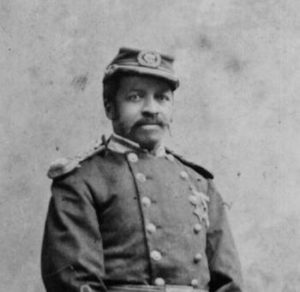
Christian Fleetwood
Christian Fleetwood was born on this date in 1840. He was a Black army officer, editor, musician, and government officer.
Christian Abraham Fleetwood was from Baltimore, the son of Charles and Anna Maria Fleetwood, both free persons of color. Christian received his early education in the home of a wealthy white sugar merchant, John C. Brunes, and his wife. He continued his education in the office of the secretary of the Maryland Colonization Society.
He spent time in Liberia and Sierra Leone and graduated in 1860 from Ashmun Institute (later Lincoln University) in Oxford, Pennsylvania. Fleetwood and others briefly published the Lyceum Observer in Baltimore, said to be the first Negro newspaper in the upper South.
During the American Civil War, he enlisted in the Union Army on August 17, 1863. Enlisting as a sergeant in Company G, 4th Regiment, U.S. Colored Volunteer Infantry, he was promoted on August 19 to sergeant major. The regiment, assigned to the 3rd Division, saw service with the 10th, 18th, and 25th Army Corps in campaigns in North Carolina and Virginia. He was awarded the Congressional Medal of Honor for heroism in the critical Battle of Chaffin's Farm on the outskirts of Richmond on September 29, 1864. Although every regiment officer sent a petition for him to be commissioned an officer, Secretary of War Edwin Stanton did not recommend an appointment. Fleetwood was honorably discharged on May 4, 1866.
Afterward, he worked as a bookkeeper in Columbus, Ohio, until 1867 and then in several minor government positions in the Freedmen's Bank and the War Department in Washington, D.C. On November 16, 1869, he married Sara Iredell, with whom he led an active social life. In the 1880s, he organized a battalion of D.C. National Guards and the high school cadet corps. His military career inspired Fleetwood's interest in the Washington Colored National Guard and the colored high school cadet corps.
A Washington cadet corps organized and commanded by Capt. D. Graham on June 12, 1880. It was expanded into the Sixth Battalion of D.C. National Guards on July 18, 1887, with Fleetwood appointed major and commanding officer. After reorganizations, several Negro battalions were consolidated into the First Separate Battalion in 1891.
Fleetwood resigned in 1892 after being passed over as its commanding officer. Meanwhile, he and Major Charles B. Fisher, who had commanded the Fifth Battalion, were instrumental in organizing the Colored High School Cadet Corps of the District of Columbia in 1888. Military science instruction was first offered in the Miner Building, 17th and Church Streets NW. Still, the cadets drilled at the O Street Armory of the Washington Cadet Corps because of inadequate facilities.
Fleetwood was the first instructor of the colored high school cadets and served until 1897 when Major Arthur Brooks succeeded him. These two officers developed a tradition of military service among young colored men in Washington, leading some to enlist in World War I and others to be commissioned at the Colored Officers Training Camp in Fort Des Moines, Iowa.
Fleetwood never returned to active duty with any military organization. However, many residents of the District of Columbia recommended that he be appointed Commander of the 50th U.S. Colored Volunteer Infantry during the Spanish-American War. The War Department did not seriously consider this request, and the participation of colored soldiers from the District of Columbia was similarly disregarded. It is unknown whether Fleetwood's short stature and physical ailments reduced his chances for consideration. His army records state that he was five feet, four and one half inches tall. These records also state that he applied in 1891 for a pension because of "total" deafness in his left ear, the result of "gunshot concussion," and "severe" in his right ear, the result of catarrh contracted while in the army. His application also stated that these ailments prevented him from speaking or singing in public.
For several years, he served as a choirmaster of the 15th Street Presbyterian Church, St. Luke's, St. Mary's Protestant Episcopal Churches, and the Berean Baptist Church. Supported by the community, including the wives of former presidents (Lucy Webb Hayes and Francis Folsom Cleveland), his musical presentations were extremely successful.
Fleetwood was acquainted with most of the prominent Blacks of the period. They frequently visited his residence and presented him with a testimonial in 1889. He died suddenly of heart failure in Washington on September 28, 1914. Funeral services were held at St. Luke's Episcopal Church. The interment was in Harmony Cemetery, Washington, D.C.
American Legacy Magazine
Various article authors
519 Barcliff Road
Bolingbrook, Ill 60440-9855